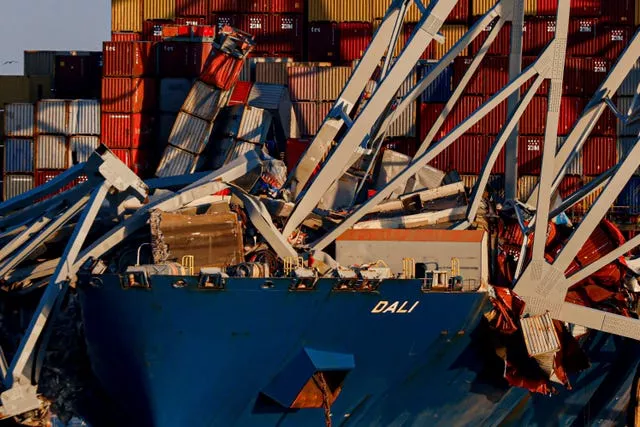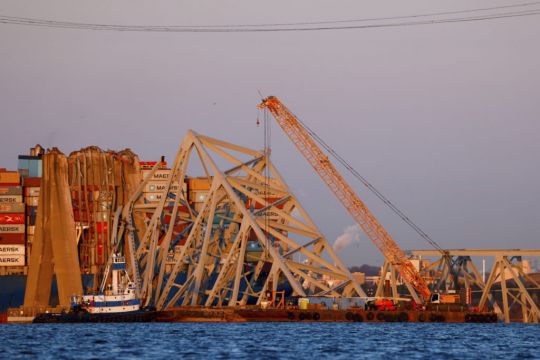Teams of engineers are continuing the intricate process of cutting and lifting the first section of twisted steel from the collapsed Francis Scott Key Bridge, which crumpled into the Patapsco River this week after a cargo ship crashed into one of its supports.
Sparks could be seen flying from a section of bent and crumpled steel as the work began on Saturday afternoon, and video released by officials in the evening showed demolition crews using a cutting torch to slice through the thick beams on the top of the north side of the collapsed structure.
Crews are carefully measuring and cutting the steel from the broken bridge before attaching straps so it can be lifted on to a barge and floated away, said Shannon Gilreath of the US Coastguard.
Seven floating cranes – including a massive one capable of lifting 1,000 tons – 10 tugboats, nine barges, eight salvage vessels and five Coastguard boats are on site in the water south-east of Baltimore.

Each movement affects what happens next and ultimately how long it will take to remove all the debris and reopen the shipping channel and the blocked Port of Baltimore, Maryland governor Wes Moore said.
“I cannot stress enough how important the first movement of this bridge and of the wreckage is,” he said. “This is going to be a remarkably complicated process.”
One of the first goals for crews on the water is to get a smaller auxiliary shipping channel open so tugboats and other small barges can move freely. Crews also want to stabilise the site so divers can resume searching for four missing workers who are presumed dead.
Two other workers were rescued from the water in the hours following the bridge collapse, and the bodies of two more were recovered from a truck that fell and was submerged in the river. They had been filling potholes on the bridge at the time of the collapse.

Police were able to stop vehicle traffic crossing the bridge after the ship called in a mayday, they could not get to the construction workers, who were from Mexico, Guatemala, Honduras and El Salvador.
The crew of the cargo ship Dali, which is managed by Synergy Marine Group, remain on board with the debris from the bridge around it, and they are being interviewed about what happened. They are keeping the ship running as they will be needed to get it out of the channel once more debris has been removed.
The vessel is owned by Grace Ocean Private and was chartered by Danish shipping giant Maersk.
The collision and collapse appeared to be an accident that came after the ship lost power. Federal and state investigators are still trying to determine why.

Environmental experts have said there is no indication in the water of active releases from the ship or materials hazardous to human health.
Meanwhile, officials are trying to figure out how to handle the economic impact of a closed port and the severing of a major road link.
Maryland transportation officials are planning to rebuild the bridge, promising to consider innovative designs or building materials to hopefully shorten a project that could take years.
US president Joe Biden’s administration has approved $60 million in immediate aid and promised the federal government will pay the full cost to rebuild.
Ship traffic at the Port of Baltimore remains suspended, but the Maryland Port Administration said lorries are still being processed at marine terminals.
The loss of a road that carried 30,000 vehicles a day and the port disruption will affect not only thousands of dockworkers and commuters, but also US consumers, who are likely to feel the impact of shipping delays. The port handles more cars and more farm equipment than any other US facility.







